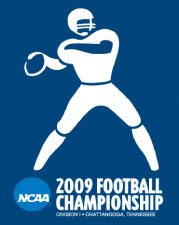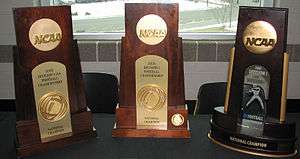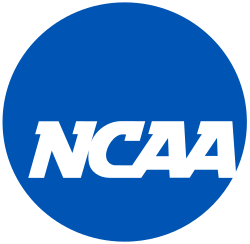NCAA Division I Football Championship

The NCAA Division I Football Championship[1] is an American college football tournament played each year to determine the champion of the NCAA Division I Football Championship Subdivision (FCS). Prior to 2006, the game was known as the NCAA Division I-AA Football Championship. The FCS is the highest division in college football to hold a playoff tournament sanctioned by the NCAA to determine its champion. The four-team playoff system used by the Bowl Subdivision is not sanctioned by the NCAA.
The reigning national champions are the North Dakota State Bison, who have won five consecutive Championship games. They are the first team at any level of NCAA football to win five consecutive titles. The Bison are the only FCS team to have appeared in five straight championship games.
History

When Division I-AA was formed for football in 1978, the playoffs included just four teams, doubling to eight teams in its fourth season of 1981. In 1982 the I-AA playoffs were expanded to 12 teams, with each of the top four seeds receiving a first-round bye and a home game in the quarterfinals. In its ninth season of 1986, the I-AA playoffs were expanded again to a 16-team format, requiring four post-season victories to win the title. Eight conference champions received automatic bids, with the remaining eight bids available on an at-large basis. The field is traditionally set the Sunday before Thanksgiving and play begins that weekend. The top four teams are seeded; however, the matchups are not strictly set up by these seedings as geographic considerations are also taken into account to minimize travel. In April 2008 the NCAA announced that the playoff field would again expand to include 20 teams beginning in 2010. At the same time, it announced that the number of conferences receiving automatic bids would increase to 10. The structure then adopted included eight teams playing in four first round games. The four first round winners advance to the second Round of Sixteen where they play the top four seeds.
The playoffs expanded to 24 teams beginning with the 2013 season. The number of conferences whose champions receive automatic bids increased to 11 with the addition of a bid for the Pioneer Football League and the number of first-round games increased from four to eight.
The tournament has historically been played in November and December; with the 2010 expansion to a 20-team field, the championship game moved from December to January. From 1997 through 2009, the title game had been played in Chattanooga, Tennessee at Finley Stadium, the home football venue of the University of Tennessee at Chattanooga, and at Marshall University Stadium (now Joan C. Edwards Stadium) on the Marshall University campus in the 5 years prior to that. The title game is now played in the Dallas suburb of Frisco, Texas at Toyota Stadium (known as Pizza Hut Park until the day after the championship game of the 2011 season, and then as FC Dallas Stadium until September 2013), a multi-purpose stadium primarily used by FC Dallas of Major League Soccer. The original contract with Frisco began in the 2010 season and ran through the 2012 season.[2] The contract has since been extended twice, first through the 2015 season[3] and later through the 2019 season.[4]
Three Football Championship Subdivision conferences usually do not participate in the tournament. The Ivy League, which has been at the FCS level since 1982 and prohibits its members from awarding athletic scholarships in any sport, plays a strict ten-game regular season and does not participate in any post-season football, citing academic concerns.[5][6] The Southwestern Athletic Conference and Mid-Eastern Athletic Conference, two conferences consisting of historically black colleges and universities, opt to play the Celebration Bowl (which was established in 2015) instead of the FCS tournament; the MEAC gave up its spot in the tournament prior to the 2015 season, while the SWAC (whose regular season extends through the Turkey Day Classic and Bayou Classic at the end of November and holds its own championship game in December) has not sent a team to the tournament since 1997.[7] In addition, the Pioneer Football League (PFL), the only other Division I football conference that does not award scholarships, did not have an automatic bid into the tournament until 2013 and none of its teams ever received an at-large bid into the tournament before then.[8]
The teams that make the playoffs are determined by the FCS Playoff Selection Committee, which consists of one athletic director from each of the 10 conferences which have automatic bids. The current committee chairman is Mark Wilson (Tennessee Tech). The others who serve on the selection committee are Chuck Burch (Gardner-Webb), Troy Dannen (Northern Iowa), Brian Hutchinson (Morehead State), Richard Johnson (Wofford), Nathan Pine (Holy Cross), Marty Scarano (New Hampshire), Paul Schlickmann (Central Connecticut State), Dr. Brad Teague (Central Arkansas) and Jeff Tingey (Idaho State).
FCS conferences
- Big Sky Conference
- Big South Conference
- Colonial Athletic Association
- Ivy League+
- Mid-Eastern Athletic Conference++
- Missouri Valley Football Conference
- Northeast Conference
- Ohio Valley Conference
- Patriot League
- Pioneer Football League
- Southern Conference
- Southland Conference
- Southwestern Athletic Conference%
+ The Ivy League abstains from the championship tournament and all postseason play.
++ The MEAC, since 2015, abstains from the championship tournament to allow for participation in the Celebration Bowl.
% The SWAC abstains from the championship tournament to allow for a longer regular season, an in-conference championship game, and (since 2015) participation in the Celebration Bowl.
Champions
| Year | Champion[9] | Runner-up | Score | Venue | Location | Attendance | Winning Head Coach |
|---|---|---|---|---|---|---|---|
| 1978 | Florida A&M | Massachusetts | 35–28 | Memorial Stadium | Wichita Falls, Texas | 13,604 | Hubbard, RudyRudy Hubbard |
| 1979 | Eastern Kentucky | Lehigh | 30–7 | Orlando Stadium | Orlando, Florida | 5,500 | Kidd, RoyRoy Kidd |
| 1980 | Boise State | Eastern Kentucky | 31–29 | Hughes Stadium | Sacramento, California | 8,157 | Criner, JimJim Criner |
| 1981 | Idaho State | Eastern Kentucky | 34–23 | Memorial Stadium | Wichita Falls, Texas | 11,003 | Kragthorpe, DaveDave Kragthorpe |
| 1982 | Eastern Kentucky (2) | Delaware | 17–14 | Memorial Stadium | Wichita Falls, Texas | 11,257 | Kidd, RoyRoy Kidd (2) |
| 1983 | Southern Illinois | Western Carolina | 43–7 | Johnson Hagood Stadium | Charleston, South Carolina | 15,950 | Dempsey, ReyRey Dempsey |
| 1984 | Montana State | Louisiana Tech | 19–6 | Johnson Hagood Stadium | Charleston, South Carolina | 9,125 | Dave Arnold |
| 1985 | Georgia Southern | Furman | 44–42 | Tacoma Dome | Tacoma, Washington | 5,306 | Russell, ErkErk Russell |
| 1986 | Georgia Southern (2) | Arkansas State | 48–21 | Tacoma Dome | Tacoma, Washington | 4,419 | Russell, ErkErk Russell (2) |
| 1987 | Northeast Louisiana† | Marshall | 43–42 | Mini Dome | Pocatello, Idaho | 11,513 | Collins, PatPat Collins |
| 1988 | Furman | Georgia Southern | 17–12 | Holt Arena | Pocatello, Idaho | 11,500 | Jimmy Satterfield |
| 1989 | Georgia Southern (3) | Stephen F. Austin | 37–34 | Paulson Stadium | Statesboro, Georgia | 25,725 | Russell, ErkErk Russell (3) |
| 1990 | Georgia Southern (4) | Nevada | 36–13 | Paulson Stadium | Statesboro, Georgia | 23,204 | Tim Stowers |
| 1991 | Youngstown State | Marshall | 25–17 | Paulson Stadium | Statesboro, Georgia | 12,667 | Tressel, JimJim Tressel |
| 1992 | Marshall | Youngstown State | 31–28 | Marshall University Stadium | Huntington, West Virginia | 31,304 | Donnan, JimJim Donnan |
| 1993 | Youngstown State (2) | Marshall | 17–5 | Marshall University Stadium | Huntington, West Virginia | 29,218 | Tressel, JimJim Tressel (2) |
| 1994 | Youngstown State (3) | Boise State | 28–14 | Marshall University Stadium | Huntington, West Virginia | 27,674 | Tressel, JimJim Tressel (3) |
| 1995 | Montana | Marshall | 22–20 | Marshall University Stadium | Huntington, West Virginia | 32,106 | Read, DonDon Read |
| 1996 | Marshall (2) | Montana | 49–29 | Marshall University Stadium | Huntington, West Virginia | 30,052 | Pruett, BobBob Pruett |
| 1997 | Youngstown State (4) | McNeese State | 10–9 | Finley Stadium | Chattanooga, Tennessee | 14,771 | Tressel, JimJim Tressel (4) |
| 1998 | Massachusetts | Georgia Southern | 55–43 | Finley Stadium | Chattanooga, Tennessee | 17,501 | Whipple, MarkMark Whipple |
| 1999 | Georgia Southern (5) | Youngstown State | 59–24 | Finley Stadium | Chattanooga, Tennessee | 20,052 | Johnson, PaulPaul Johnson |
| 2000 | Georgia Southern (6) | Montana | 27–25 | Finley Stadium | Chattanooga, Tennessee | 17,156 | Johnson, PaulPaul Johnson (2) |
| 2001 | Montana (2) | Furman | 13–6 | Finley Stadium | Chattanooga, Tennessee | 12,698 | Glenn, JoeJoe Glenn |
| 2002 | Western Kentucky | McNeese State | 34–14 | Finley Stadium | Chattanooga, Tennessee | 12,360 | Harbaugh, JackJack Harbaugh |
| 2003 | Delaware | Colgate | 40–0 | Finley Stadium | Chattanooga, Tennessee | 14,281 | Keeler, K. C.K. C. Keeler |
| 2004 | James Madison | Montana | 31–21 | Finley Stadium | Chattanooga, Tennessee | 16,771 | Mickey Matthews |
| 2005 | Appalachian State | Northern Iowa | 21–16 | Finley Stadium | Chattanooga, Tennessee | 20,236 | Moore, JerryJerry Moore |
| 2006 | Appalachian State (2) | Massachusetts | 28–17 | Finley Stadium | Chattanooga, Tennessee | 22,808 | Moore, JerryJerry Moore (2) |
| 2007 | Appalachian State (3) | Delaware | 49–21 | Finley Stadium | Chattanooga, Tennessee | 23,010 | Moore, JerryJerry Moore (3) |
| 2008 | Richmond | Montana | 24–7 | Finley Stadium | Chattanooga, Tennessee | 17,823 | London, MikeMike London |
| 2009 | Villanova | Montana | 23–21 | Finley Stadium | Chattanooga, Tennessee | 14,328 | Talley, AndyAndy Talley |
| 2010 | Eastern Washington | Delaware | 20–19 | Pizza Hut Park‡ | Frisco, Texas | 13,027 | Baldwin, BeauBeau Baldwin |
| 2011 | North Dakota State | Sam Houston State | 17–6 | Pizza Hut Park‡ | Frisco, Texas | 20,586 | Bohl, CraigCraig Bohl |
| 2012 | North Dakota State (2) | Sam Houston State | 39–13 | FC Dallas Stadium‡ | Frisco, Texas | 21,411 | Bohl, CraigCraig Bohl (2) |
| 2013 | North Dakota State (3) | Towson | 35–7 | Toyota Stadium | Frisco, Texas | 19,802 | Bohl, CraigCraig Bohl (3) |
| 2014 | North Dakota State (4) | Illinois State | 29–27 | Toyota Stadium | Frisco, Texas | 20,918 | Klieman, ChrisChris Klieman |
| 2015 | North Dakota State (5) | Jacksonville State | 37–10 | Toyota Stadium | Frisco, Texas | 21,836 | Klieman, ChrisChris Klieman (2) |
| 2016 | Toyota Stadium | Frisco, Texas | |||||
| 2017 | Toyota Stadium | Frisco, Texas | |||||
| 2018 | Toyota Stadium | Frisco, Texas | |||||
| 2019 | Toyota Stadium | Frisco, Texas |
† Known as University of Louisiana at Monroe since 1999.
‡ Now Toyota Stadium
Team titles
| Team | Titles | Years Won |
|---|---|---|
| Georgia Southern^ | 6 | 1985, 1986, 1989, 1990, 1999, 2000 |
| North Dakota State | 5 | 2011, 2012, 2013, 2014, 2015 |
| Youngstown State | 4 | 1991, 1993, 1994, 1997 |
| Appalachian State^ | 3 | 2005, 2006, 2007 |
| Montana | 2 | 1995, 2001 |
| Marshall^ | 2 | 1992, 1996 |
| Eastern Kentucky | 2 | 1979, 1982 |
| Delaware | 1 | 2003 |
| Furman | 1 | 1988 |
| Massachusetts^ | 1 | 1998 |
| Boise State^ | 1 | 1980 |
| Eastern Washington | 1 | 2010 |
| Florida A&M | 1 | 1978 |
| Idaho State | 1 | 1981 |
| James Madison | 1 | 2004 |
| Northeast Louisiana^ | 1 | 1987 |
| Montana State | 1 | 1984 |
| Richmond | 1 | 2008 |
| Southern Illinois | 1 | 1983 |
| Villanova | 1 | 2009 |
| Western Kentucky^ | 1 | 2002 |
^ Now a member of the Football Bowl Subdivision (FBS).
See also
- List of NCAA Division I FCS football programs
- College football national championships in NCAA Division I FBS
- NCAA Division I FCS Consensus Mid-Major Football National Championship
- NCAA Division II Football Championship
- NCAA Division III Football Championship
- NAIA National Football Championship
- NJCAA National Football Championship
- List of college bowl games
References
- ↑ NCAA Division I Football Championship - Official Web Site
- ↑ Caplan, Jeff (2010-02-26). "20 teams to compete for FCS crown". ESPNDallas.com. Retrieved 2010-02-26.
- ↑ "NCAA inks three-year extension to keep FCS title game in Frisco, Texas" (Press release). NCAA. December 19, 2012. Retrieved December 19, 2012.
- ↑ "NCAA keeping FCS title game in Frisco through at least 2020". USA Today. Associated Press. January 8, 2016. Retrieved January 12, 2016.
- ↑ Torre, Pablo (2007-11-29). "No playoffs for you!". SI. Retrieved 2009-06-27.
- ↑ David Burrick (2003-09-18). "Ivy League not likely to see I-AA playoffs". The Daily Pennsylvanian. Retrieved 2009-06-27.
- ↑ Craig T. Greenlee (2000-01-06). "Not Exactly for THE SPORT OF IT". Black Issues in Higher Education. Retrieved 2009-06-27.
- ↑ http://pflfan.proboards.com/index.cgi?board=general&action=display&thread=1144
- ↑ NCAA (2008). "FCS History".
